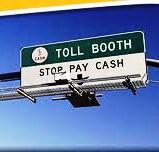Roads, Forks, and Prongs
 The term robber baron is said to have originated as a medieval name attributed to those that controlled passage on the Rhine River and charged exorbitant tolls. They recognized the power they held, as constrainers or enablers of commerce. The term lived on and thereafter was attached in 19th century America to the magnates that built and operated the railroads. Their power, the same as their predecessors, came as they became the harvesters of the power that came to gatekeepers to commercial traffic. The big and exciting commercial wars in the mid to late 1800’s were about control of the rails. The magnates who built the rails, steamship lines, and the routes of commerce did much to shape the course of history and how we operate today. We may not recognize names like Gould, Crocker, Flagler (outside of Florida), Harriman or Vanderbilt, but their tribe of visionaries and shapers continues on.
The term robber baron is said to have originated as a medieval name attributed to those that controlled passage on the Rhine River and charged exorbitant tolls. They recognized the power they held, as constrainers or enablers of commerce. The term lived on and thereafter was attached in 19th century America to the magnates that built and operated the railroads. Their power, the same as their predecessors, came as they became the harvesters of the power that came to gatekeepers to commercial traffic. The big and exciting commercial wars in the mid to late 1800’s were about control of the rails. The magnates who built the rails, steamship lines, and the routes of commerce did much to shape the course of history and how we operate today. We may not recognize names like Gould, Crocker, Flagler (outside of Florida), Harriman or Vanderbilt, but their tribe of visionaries and shapers continues on.
Modern technology has changed the methods of how commerce traffics, but little has changed insofar as the value and leverage these channels have. Getting from “here to there” matters much to commerce, buyers or sellers. Giants such as FedEx and UPS understood this well and filled the vacuums that public postal systems created. Be ye pirate or magnate, control over the lanes is real leverage.
Commercial choice is a function of degrees of freedom. The fewer degrees of freedom one party has, the lesser commercial power they can exercise. Loss of degrees of freedom in commerce fuels a range of responses as brutal as wars and as exciting as innovation, the best kind, the kind that solves problems, and the kind that is pulled by a sense of urgency. Often, history teaches that imbalanced growth of innovation creates the commercial imbalances that visionaries can see and leverage while we bask in the fun of the new solutions.
The current commercial wars are even more fascinating. These wars are about the virtual electronic waterways, invisible, infinitely networked, changing daily and ever more far reaching. The sea lanes and railways run on the net. The magnates who reshape winning and losing, acquire, rise, and fall can’t be measured by fleet size, or number of gates at physical hubs, or the endless trappings of game makers. They are creatures of our making. They are measured by our democratic behaviors, our choices, and have grown sufficiently to determine how democratic the future roadways will remain.
In our enterprises, we make daily choices about enterprise systems, business channels, email systems, network configurations, CRM applications and innovations to give us more transparency, build capabilities, and achieve leverage of resources and investments.
• How will our choices give up degrees of freedom that construct future system constraints?
• Do our strategic decisions create more choices and preserve flexibility?
• Do we “hard wire” ourselves onto roadways with visionary gatekeepers that will shape our futures?
• Have yesterday’s solutions become today’s constraints?
• How do we currently preserve or give away degrees of freedom in our strategic choices?
“Concentrated power has always been the enemy of liberty.” Ronald Reagan

